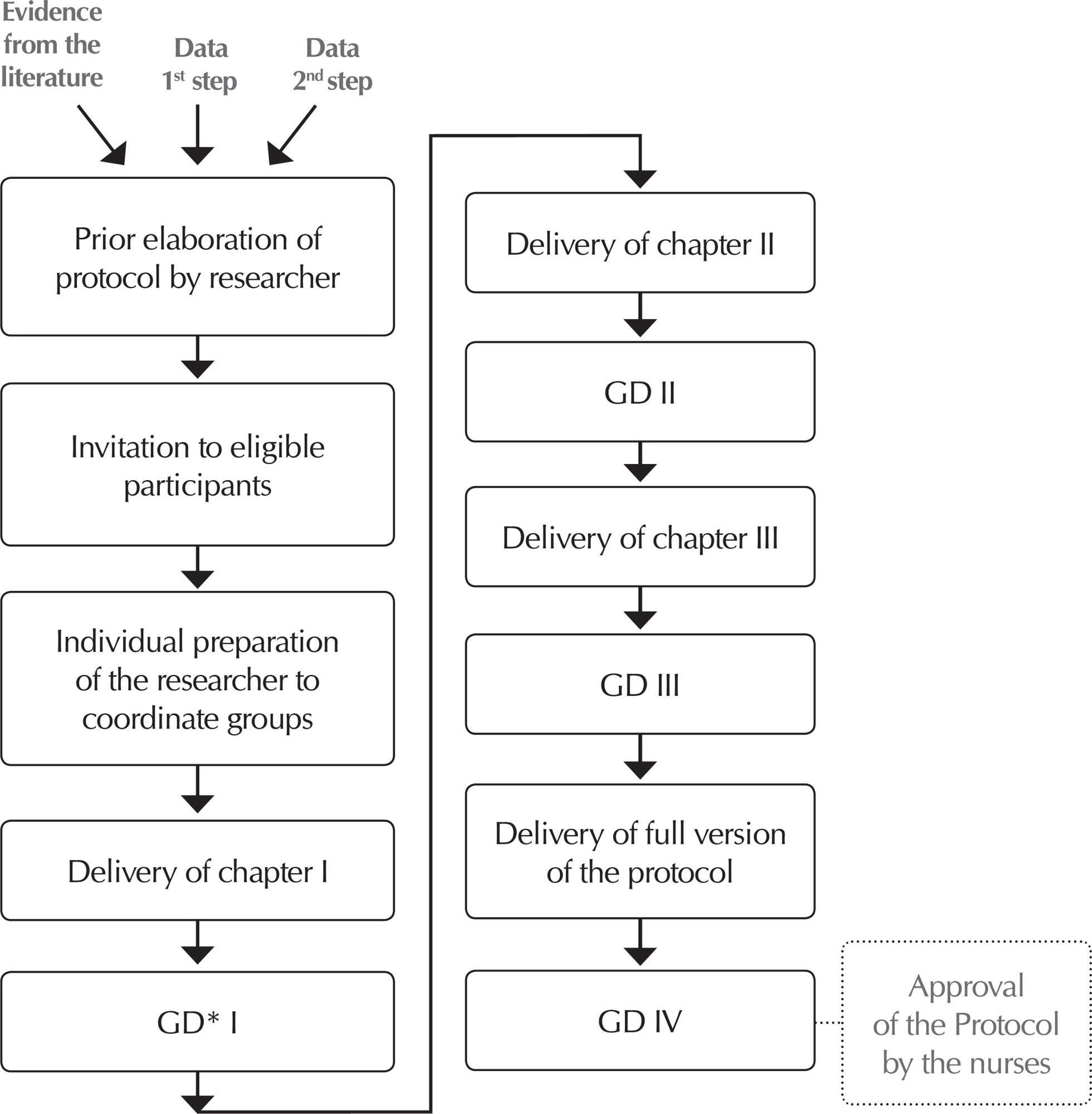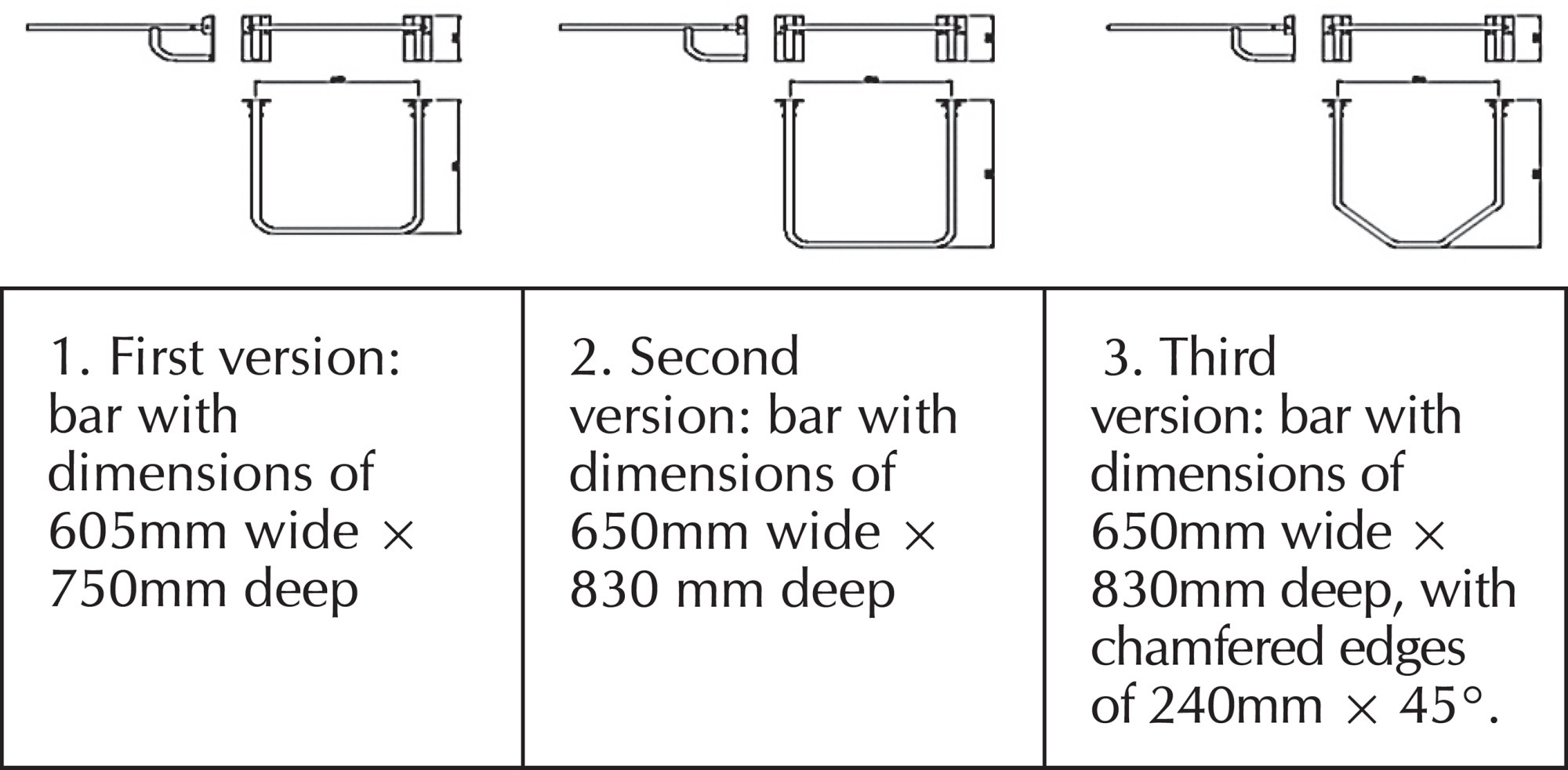-
RESEARCH01-01-2018
Deontological aspects of the nursing profession: understanding the code of ethics
Revista Brasileira de Enfermagem. 2018;71(1):3-10
Abstract
RESEARCHDeontological aspects of the nursing profession: understanding the code of ethics
Revista Brasileira de Enfermagem. 2018;71(1):3-10
DOI 10.1590/0034-7167-2016-0565
Views0See moreABSTRACT
Objective:
to investigate nursing professionals’ understanding concerning the Code of Ethics; to assess the relevance of the Code of Ethics of the nursing profession and its use in practice; to identify how problem-solving is performed when facing ethical dilemmas in professional practice.
Method:
exploratory descriptive study, conducted with 34 (thirty-four) nursing professionals from a teaching hospital in João Pessoa, PB – Brazil.
Results:
four thematic categories emerged: conception of professional ethics in nursing practice; interpretations of ethics in the practice of care; use of the Code of Ethics in the professional practice; strategies for solving ethical issues in the professional practice.
Final considerations:
some of the nursing professionals comprehend the meaning coherently; others have a limited comprehension, based on jargon. Therefore, a deeper understanding of the text contained in this code is necessary so that it can be applied into practice, aiming to provide a quality care that is, above all, ethical and legal.
-
01-01-2018
It is not a crisis itself, if does not promote changes
Revista Brasileira de Enfermagem. 2018;71(1):1-2
Abstract
It is not a crisis itself, if does not promote changes
Revista Brasileira de Enfermagem. 2018;71(1):1-2
DOI 10.1590/0034-7167.2018710101
Views1ECONOMIC CRISISBrazil has been going through crisis in the past three years, due to often and systemic cuts in funds in multiple fields of society, such as education, health, science and technology, affecting directly on Brazilian scientific production. The nursing scientific production – as being an integrative part – now experiences a phase of quantitative […]See more -
01-01-2018
Uma crise que não gera mudanças não é uma crise em sua essência
Revista Brasileira de Enfermagem. 2018;71(1):1-2
Abstract
Uma crise que não gera mudanças não é uma crise em sua essência
Revista Brasileira de Enfermagem. 2018;71(1):1-2
DOI 10.1590/0034-7167.2018710101
Views0A CRISE ECONÔMICAAs dificuldades político-econômicas que o Brasil atravessa nos últimos três anos, com cortes frequentes e sistemáticos de recursos nas mais diversas áreas, incluindo educação, saúde, ciência e tecnologia, repercutem diretamente na produção científica brasileira. Como parte integrante desse sistema, a produção científica da enfermagem passa a experimentar uma fase de declínio quantitativo na […]See more -
REFLECTION01-01-2018
Nursing and light technologies for a peace culture within the family
Revista Brasileira de Enfermagem. 2018;71:2854-2857
Abstract
REFLECTIONNursing and light technologies for a peace culture within the family
Revista Brasileira de Enfermagem. 2018;71:2854-2857
DOI 10.1590/0034-7167-2017-0756
Views0See moreABSTRACT
Objective:
To reflect on technologies for the peace culture that can be used in family nursing.
Method:
Theoretical essay, based on the premises of non-violence and peace culture.
Results:
Four light technologies are singled out for the peace culture within families: nonviolent communication, qualified listening, conflict mediation, and restorative circles.
Conclusion:
The technologies proposed can be used by nurses to promote care and policies aiming at a peace culture and non-violence in families, with the objective of assisting in the obtainment of the well-being for family systems and their correlations.
-
REFLECTION01-01-2018
The face-to-face encounter in indigenous health care: a perspective in Lévinas
Revista Brasileira de Enfermagem. 2018;71:2848-2853
Abstract
REFLECTIONThe face-to-face encounter in indigenous health care: a perspective in Lévinas
Revista Brasileira de Enfermagem. 2018;71:2848-2853
DOI 10.1590/0034-7167-2017-0389
Views0See moreABSTRACT
Objective:
To reflect on the sensitive behaviors of indigenous healthcare professionals based on the philosophy of Emmanuel Lévinas, to ratify completeness, equity, and humanity.
Method:
reflective study.
Reflection:
Studies have identified inadequacies in meeting the indigenous singularities. In the hospital and outpatient settings, they are diluted in the search for care. The difficulty of the professionals to admit them generates conflicts and non-adherence of indigenous individuals to treatments that disregard their care practices. In Lévinas, consciousness requires, “a priori,” sensitivity to access the Infinity on the Face of the Other, which in the face-to-face encounters is presented to the Self as radical Alterity, proposing an Ethical relationship through transcendence. The freedom of the Self as to the Other is finite, as the Self cannot possess the Other, and infinite for its responsibility for the Other.
Final considerations:
The Self builds essence and existence in responsibility. In the Ethics of Alterity, in Lévinas, reflections are proposed that influence sensitive behaviors.
-
EXPERIENCE REPORT01-01-2018
Implementation of the Street Outreach Office in the perspective of health care
Revista Brasileira de Enfermagem. 2018;71:2843-2847
Abstract
EXPERIENCE REPORTImplementation of the Street Outreach Office in the perspective of health care
Revista Brasileira de Enfermagem. 2018;71:2843-2847
DOI 10.1590/0034-7167-2017-0616
Views0See moreABSTRACT
Objective:
To report the experience of implementation of a clinical equipment of health care production to homeless people, denominated Street Outreach Office.
Method:
Experience report in the city of Rio de Janeiro, Brazil.
Results:
The Street Outreach Office implementation resulted from a demand for health care practices for homeless people. This implementation had intersectoral articulations, causing health professionals to carry out street care practices, which led them to strive for public policies, to rethink their actions in order to increase the resolution of care to this population.
Conclusion:
We should emphasize the importance of health professionals to reinvent their practices, daily, seeking partnerships and acquisition of new knowledge in order to achieve results that can reduce the demands of these individuals throughout their life routes.
-
EXPERIENCE REPORT01-01-2018
Developing a nursing healthcare protocol: a case report
Revista Brasileira de Enfermagem. 2018;71:2837-2842
Abstract
EXPERIENCE REPORTDeveloping a nursing healthcare protocol: a case report
Revista Brasileira de Enfermagem. 2018;71:2837-2842
DOI 10.1590/0034-7167-2017-0846
Views0See moreABSTRACT
Objective:
to report the use experience of convergent healthcare research for developing a nursing care protocol.
Method:
convergent care research developed in university hospital, from July to December 2016, with 27 participants.
Results:
the stages of the research and its results are described in the steps: conception, instrumentation, screening and analysis. The end result was the nursing care protocol in day zero of hematopoietic stem cell transplantation.
Conclusion:
convergent care research was an appropriate method for developing the care protocol, and an important contribution to the approximation between theory and practice. The nursing care protocol was the result of this study and confirmed both the purpose of the research as a professional Master’s in acquiring knowledge aimed at improving professional practice.

-
EXPERIENCE REPORT01-01-2018
Safe Embrace: technological innovation for elderly safety in the use of toilets
Revista Brasileira de Enfermagem. 2018;71:2833-2836
Abstract
EXPERIENCE REPORTSafe Embrace: technological innovation for elderly safety in the use of toilets
Revista Brasileira de Enfermagem. 2018;71:2833-2836
DOI 10.1590/0034-7167-2017-0751
Views0See moreABSTRACT
Objective:
to describe the development of a device to prevent falling for seniors when using the toilet.
Method:
we sought in literature and in the hospital market for a device to prevent falling, without success. Geriatric nurses, in partnership with the hospital engineering team, elaborated a prototype and, after several analysis, looked for a partner for its production.
Results:
the device, named “Safe Embrace”, installed and tested in an apartment of the Geriatric ward, was positively evaluated by the health team, patients and caregivers.
Conclusion:
for the benefit obtained and considering the safety and privacy during use, Safe Embrace was patented so that other institutions could use it.

-
ORIGINAL ARTICLE10-21-2019
Permanent education for good practices in the prevention of pressure injury: almost-experiment
Revista Brasileira de Enfermagem. 2019;72(6):1646-1652
Abstract
ORIGINAL ARTICLEPermanent education for good practices in the prevention of pressure injury: almost-experiment
Revista Brasileira de Enfermagem. 2019;72(6):1646-1652
DOI 10.1590/0034-7167-2018-0778
Views0See moreABSTRACT
Objective:
To verify the effectiveness of the educational intervention through the evaluation of nurses’ knowledge about prevention of pressure injury.
Method:
A quasi-experimental study with a single group, carried out with 95 nurses from a teaching hospital in the interior of Minas Gerais, in August and September 2017. As a teaching strategy, the active methodology and hybrid teaching were used, based on the reference of the Method of the Arch of Charles Maguerez. Data were collected from a validated instrument, called the Pieper Knowledge Test, and analyzed by descriptive statistics and Student’s t-test with significance level of p <0.001.
Results:
The mean number of correct answers obtained by the nurses was 78.8% in the pre-test and 88.8% in the post-test, and the difference was statistically significant (p <0.001).
Conclusion:
The educational intervention developed was effective, since it contributed to the improvement of nurses’ knowledge.

-
ORIGINAL ARTICLE02-10-2020
Nursing practices in a psychological care center
Revista Brasileira de Enfermagem. 2020;73(1):e20180175
Abstract
ORIGINAL ARTICLENursing practices in a psychological care center
Revista Brasileira de Enfermagem. 2020;73(1):e20180175
DOI 10.1590/0034-7167-2018-0175
Views0See moreABSTRACT
Objective:
To analyze the practices developed by nursing professionals in a Psychosocial Care Center (CAPS).
Method:
A qualitative and evaluative research based on the Fourth Generation Assessment and conducted in a CAPS II of Santa Catarina State in 2014. For data collection, semi-structured interviews, field observation, and data recycling group were used with workers. Constant Comparative Method was used for data analysis.
Results:
Practices aimed at the subject and their clinical, social, prevention, treatment and articulation with the health network were identified. Medication care is a specificity of nursing that aims to promote autonomy and social reintegration. There is a need for greater articulation between the nursing and pharmacy staff, as well as creating spaces for users to talk about medication.
Conclusion:
Nursing practices are focused on biopsychosocial care, aiming to deconstruct care models focused on the disease and symptoms.
-
ORIGINAL ARTICLE06-17-2020
Cardiovascular risk factors: differences between ethnic groups
Revista Brasileira de Enfermagem. 2020;73(4):e20180918
Abstract
ORIGINAL ARTICLECardiovascular risk factors: differences between ethnic groups
Revista Brasileira de Enfermagem. 2020;73(4):e20180918
DOI 10.1590/0034-7167-2018-0918
Views0See moreABSTRACT
Objectives:
to compare the metabolic, anthropometric, tobacco and alcohol consumption indicators considered as risk factors for cardiovascular diseases, as well as the demographic and socioeconomic characteristics between indigenous from Rio Negro, Sateré-Mawé, mixed-race/black and white people living in the city of Manaus.
Methods:
a cross-sectional observational study guided by the STROBE tool. There was a sample of 191 adults of both sexes. Anthropometric measurements, blood pressure and biochemical analyzes were performed. Statistical test was applied to cross color/race/ethnicity variable with the investigated variables.
Results:
indigenous had better metabolic and anthropometric indicators related to cardiovascular diseases than mixed-race/black and white, as well as Sateré-Mawé in relation to Rionegrinos (from Rio Negro).
Conclusions:
the main differences were obesity, dyslipidemia, pre-systemic arterial hypertension/systemic arterial hypertension, and increased circumferences, with a worse situation for mixed-race/black people. The findings indicate differences in risk factors between race/color and ethnicity groups evaluated.
-
ORIGINAL ARTICLE05-18-2020
Construction and validation of an educational video for human papillomavirus vaccination
Revista Brasileira de Enfermagem. 2020;73(4):e20180900
Abstract
ORIGINAL ARTICLEConstruction and validation of an educational video for human papillomavirus vaccination
Revista Brasileira de Enfermagem. 2020;73(4):e20180900
DOI 10.1590/0034-7167-2018-0900
Views0See moreABSTRACT
Objectives:
to validate an educational video aimed at the adhesion of human papillomavirus vaccination.
Methods:
a methodological study, where the knowledge about the theme and the technology to be constructed in six focal groups was identified; a theoretical framework was set up and the existing videos were uploaded. After that, pre-production, production and post-production were followed. In validation of content, 22 specialists participated, and in appearance, ten adolescents, ten mothers, ten teachers and ten audiovisual professionals. Absolute frequency, Binomial Test, and Content Validity Index were used.
Results:
agreement was satisfactory in most items. Regarding relevance, 20 items had indices above 0.80 among judges. Assessment was positive among girls and mothers. Only three items had indices less than 0.80 among teachers and video professionals.
Conclusions:
the educational video was validated, conferring credibility to contribute to educational actions and improve vaccination indexes.

-
08-10-2020
Repercussions of intestinal ostomy on male sexuality: an integrative review
Revista Brasileira de Enfermagem. 2020;73(6):e20190245
Abstract
Repercussions of intestinal ostomy on male sexuality: an integrative review
Revista Brasileira de Enfermagem. 2020;73(6):e20190245
DOI 10.1590/0034-7167-2019-0245
Views2INTRODUCTIONThe intestinal ostomy, also known as stoma and ostomy, consists of an artificial opening, produced surgically, whose purpose is to divert the flow of effluents to the external environment. Such a condition can impact the lives of affected individuals due to transformations that affect human multi-dimensionality, including negative repercussions involving sexuality(–).In the United States of […]See more
-
ORIGINAL ARTICLE08-20-2021
Risk of suicide among nursing students
Revista Brasileira de Enfermagem. 2021;74(6):e20200867
Abstract
ORIGINAL ARTICLERisk of suicide among nursing students
Revista Brasileira de Enfermagem. 2021;74(6):e20200867
DOI 10.1590/0034-7167-2020-0867
Views0See moreABSTRACT
Objectives:
to identify the risk and degree of risk of suicide in nursing students of a public institution in the countryside of Pernambuco, Brazil.
Methods:
this was a cross-sectional, quantitative research conducted with 150 students. For data collection, a sociodemographic questionnaire and the instrument, M.I.N.I. – Brazilian version 5.0.0 – Module C – Risk of suicide were used. Statistical analyses were performed with IBM(® )SPSS(®), version 23.
Results:
53.3% of nursing students had a risk of suicide, of which 20.7% had a high risk. Moreover, 22.67% reported previous suicide attempt. It is noteworthy that students without a partner have a higher risk of suicide (56.8%) than those with a partner (29.4%).
Conclusions:
it is perceived the need to develop programs that identify students at risk of suicide in higher education institutions, in order to raise awareness of the problem and implement policies to promote mental health in the academia.
-
ORIGINAL ARTICLE06-01-2020
Primary care mental health: nurses’ activities in the psychosocial care network
Revista Brasileira de Enfermagem. 2020;73:e20190104
Abstract
ORIGINAL ARTICLEPrimary care mental health: nurses’ activities in the psychosocial care network
Revista Brasileira de Enfermagem. 2020;73:e20190104
DOI 10.1590/0034-7167-2019-0104
Views0See moreABSTRACT
Objective:
to describe and analyze the role of expert nurses in mental health in the Family Health Strategy.
Method:
a qualitative study, with 20 Basic Health Units nurses of Teresina, Piauí. The information was collected through semi-structured interviews from March to May 2017 and analyzed using the content analysis method.
Results:
it was found that the conceptions of the mental health disease process were based on the biological model, there was little communication between mental health and basic network, nurses did not feel qualified to work mental health and there were few mental health actions in Primary Care.
Final considerations:
it becomes urgent to implement public policies that articulate mental health and Primary Care, raising awareness and continuing education for nurses.
-
ORIGINAL ARTICLE03-30-2020
Team-Based Learning: a randomized clinical trial in undergraduate nursing
Revista Brasileira de Enfermagem. 2020;73(2):e20180621
Abstract
ORIGINAL ARTICLETeam-Based Learning: a randomized clinical trial in undergraduate nursing
Revista Brasileira de Enfermagem. 2020;73(2):e20180621
DOI 10.1590/0034-7167-2018-0621
Views0See moreABSTRACT
Objectives:
To compare the knowledge on surgical safety through the team-based learning methodology and lecture classes for undergraduate Nursing students, and evaluate the learning satisfaction with team-based learning.
Methods:
Randomized, controlled, parallel, two-arm, unblinded clinical trial developed in the Faculty of Medicine of a public university in Botucatu, Brazil. The groups included 14 students for team-based learning and 11 students for lecture classes.
Results:
Students’ apprehension of knowledge in the team-based learning group was significantly higher compared to the control group (p<0.002) by considering the pre-test results. After 30 days, there was no significant difference between groups. The experience with the methodology was considered positive among students.
Conclusions:
Team-based learning is an important pedagogic tool available and has proven effective in education and learning with students playing the role of protagonists.

Search
Search in:
Nuvem de Tags
Adolescente (85) Atenção Primária à Saúde (239) COVID-19 (91) Criança (91) Cuidados de Enfermagem (269) Educação em Enfermagem (151) Educação em Saúde (139) Enfermagem (930) Enfermagem Pediátrica (86) Estudantes de Enfermagem (77) Estudos de Validação (131) Família (87) Idoso (208) Promoção da Saúde (99) Qualidade de Vida (104) Saúde do Trabalhador (86) Saúde Mental (145) Saúde Pública (82) Segurança do Paciente (150) Tecnologia Educacional (100)



